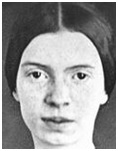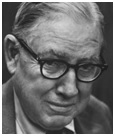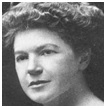|
 |
|
 |
Poetry - Love
William Blake (1757-1827), The Clod and the Pebble (1794) The English poet (pictured right) emphasizes the happiness and fulfilment love gives: Love seeketh not itself to please, Nor for itself hath any care, But for another gives its ease, And builds a heaven in hell's despair (first verse)
Robert Burns (1759-96), A Red, Red Rose (1794) The Scottish poet’s (pictured right) most famous love poem, originally written as a song.
Oh my luve is like a red, red rose, That's newly sprung in June: Oh my luve is like the melodie, That's sweetly play'd in tune. (first verse)
James Weldon Johnson (1871-1938), Beauty That Is Never
Old The American poet's (pictured right) first and last verses describe the passion of love:
When buffeted and beaten by life's storms, When by the bitter cares of life oppressed, I want no surer haven than your arms, I want no sweeter heaven than your breast...
The world, for me, and all the world can hold Is circled by your arms; for me there lies, Within the lights and shadows of your eyes, The only beauty that is never old. (first and last verse)
Emily Dickinson (1830-86), If I Can Stop One Heart From Breaking (1878) The American poet (pictured right) emphasizes the importance of compassion:
If I can stop one heart from breaking, I shall not live in vain; If I can ease one life the aching, Or cool one pain, Or help one fainting robin Unto his nest again, I shall not live in vain. (complete poem)
William Shakespeare (1564-1616), Sonnet
18 Shakespeare (pictured right) famously starts this sonnet:
Shall I compare thee to a summer's day? Thou art more lovely and more temperate... (first 2 lines)
It finishes with a wonderful description of love:
But thy eternal summer shall not fade, Nor lose possession of that fair thou ow'st, Nor shall death brag thou wander'st in his shade, When in eternal lines to time thou grow'st. So long as men can breathe or eyes can see, So long lives this, and this gives life to thee. (last 6 lines)
William Shakespeare, Sonnet 116 In this sonnet Shakespeare describes the constancy of love
Love is not love Which alters when it alteration finds, Or bends with the remover to remove: O no! it is an ever-fixed mark That looks on tempests and is never shaken. (lines 2-6)
Alfred, Lord Tennyson (1809-92), In Memoriam
A.H.H.(1844) Written in memory of the English poet’s (pictured right) friend, Arthur Henry Hallam, it contains the famous lines:
'Tis better to have loved and lost Than never to have loved at all.
Lord Byron (1788-1824), She Walks in
Beauty The English poet (pictured right) describes his love:
She walks in beauty like the night of cloudless climes and starry skies; And all that's best of dark and bright meets in her aspect and her eyes: Thus mellow'd to that tender light which heaven to gaudy day denies.
One shade the more, one ray the less, had half impair'd the nameless grace which waves in every raven tress, or softly lightens o'er her face - where thoughts serenely sweet express how pure, how dear their dwelling - place.
And on that cheek, and o'er that brow, so soft, so calm, yet eloquent, the smiles that win, the tints that glow, but tells in days of goodness spent, a mind at peace with all below, a heart whose love is innocent. (complete poem)
Elizabeth Barrett Browning (1806-61), Sonnet 43 - How Do I Love
Thee? The English poet (pictured right) describes her loved one:
How do I love thee? Let me count the ways. I love thee to the depth and breadth and height My soul can reach, when feeling out of sight For the ends of Being and ideal Grace. I love thee to the level of every day's Most quiet need, by sun and candlelight. I love thee freely, as men strive for Right; I love thee purely, as they turn from Praise. I love with a passion put to use In my old griefs, and with my childhood's faith. I love thee with a love I seemed to lose With my lost saints, -- I love thee with the breath, Smiles, tears, of all my life! -- and, if God choose, I shall but love thee better after death. (complete poem)
Elizabeth Barrett Browning , Sonnet 14 - If thou must love me, let it be for naught She starts the poem saying (naught is old English for nothing):
If thou must love me, let it be for naught Except for love's sake only.
She finishes the poem: But love me for love's sake, that evermore Thou mayst love on, through love's eternity.
Robert Service (1874-1958), Compassion (1956) The Canadian poet (pictured right) describes how easy it is to avoid your responsibility to give ( a groat in line 4 is a silver coin):
Who held a hand like withered claw, As cold as clay; But as I had no silver groat To give, I buttoned up my coat And turned away.
For God knows it is good to give; We may not have so long to live, So if we can, Let's do each day a kindly deed, And stretch a hand to those in need, Bird, beast or man. (first and last verses)
Ogden Nash (1902-71), A Word to Husbands (1964) The American poet (pictured right) gives some advice on marriage:
To keep your marriage brimming With love in the loving cup, Whenever you’re wrong, admit it; Whenever you’re right, shut up. (complete poem)
Ella Wheeler Wilcox (1850-1919), Are You Loving Enough?
The American poet (pictured right) says you'll regret not putting people first in your life:
Are you loving enough? There is some one dear, Some one you hold as the dearest of all In the holiest shrine of your heart. Are you making it known? Is the truth of it clear To the one you love? If death's quick call Should suddenly tear you apart, Leaving no time for a long farewell, Would you feel you had nothing to tell - Nothing you wished you had said before The closing of that dark door? (first verse)
Ella Wheeler Wilcox, Life Is Too Short (1883) In this poem Wilcox says we must avoid;
Life is too short for any vain regretting; Let dead delight bury its dead, I say, And let us go upon our way forgetting The joys and sorrows of each yesterday Between the swift sun's rising and its setting We have no time for useless tears or fretting: Life is too short.
Life is too short for any bitter feeling; Time is the best avenger if we wait; The years speed by, and on their wings bear healing; We have no room for anything like hate. This solemn truth the low mounds seem revealing That thick and fast about our feet are stealing: Life is too short. (first two verses)
Edward Lear, The Owl and the Pussycat (1871) The English poet (pictured right) says that love is having fun, just like the owl and the pussycat:
The Owl and the Pussy-cat went to sea In a beautiful pea green boat, They took some honey, and plenty of money, Wrapped up in a five pound note. The Owl looked up to the stars above, And sang to a small guitar, 'O lovely Pussy! O Pussy my love, What a beautiful Pussy you are, You are, You are! What a beautiful Pussy you are!' (first verse)
Kathleen Raine (1908-2003),
Confessions The English poet (pictured right) says love gives healing and meaning to your life:
Being what I am What could I do but wrong? Yet love can bring To heart healing To chaos meaning. (last verse)
Philip Larkin (1922-85), Arundel Tomb (1964) The English poet (pictured right) wisely says in the last line: What will survive of us is love.
|
|
|
||
|
|
|
||
|
||
| Copyright © wisdomtowin.com All Rights Reserved | ||
|















